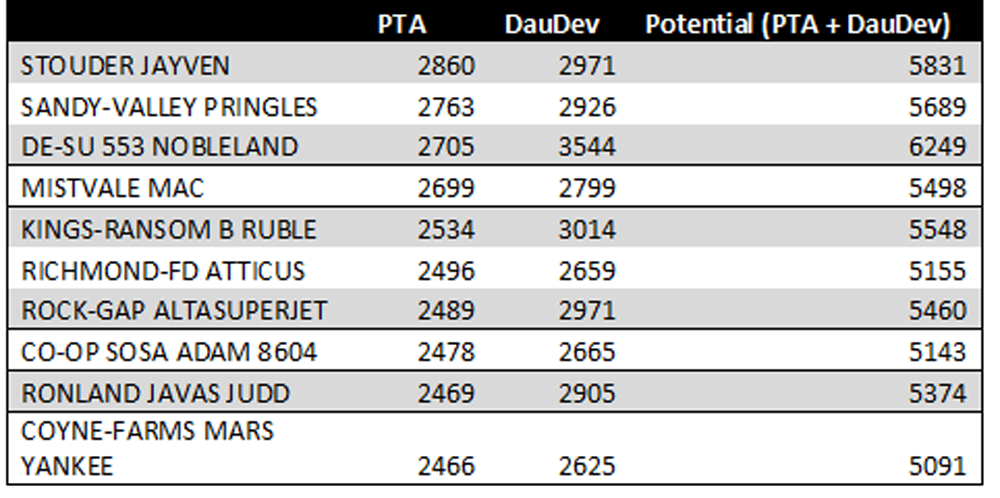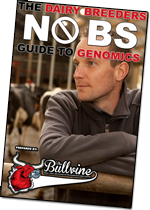There is no question that, when you are looking to breed the next great show cow or sire of show winners, you are hoping to get a high type outlier. You want to get the animal that is the farthest as possible from being average. Yet all of the indexes provided to most breeders are averages. They do not show you a sire’s ability to produce outliers. They tell you the sire’s average performance and the problem is most breeders don’t want to be average.
The easiest way to find outliers is to compare two sires for their daughters’ performance. Then identify those sires that have the greatest deviation from their average daughter. This is not to be confused with Type scores in the US that are expressed in Standard Deviations. The best way to describe this is by an example.
Let’s say we have two bulls each with 10 daughters. The following table shows their level of improvement for type across the 10 Daughters.
Both of these sires would have an average improvement of 12 points. Hypothetically if this was the whole population of their daughters they both would get the same conformation score. The problem is they are two very different sires and the numbers tell us that. However these are not the numbers that most breeders get to see.
Looking closer we see that Bull A daughters have a range of 18 points while Bull B’s daughters only range 4 points. Sure both bulls, on average, will perform the same but, when you are looking to breed for the extremes (such as AI companies are), or you are wanting to produce the most consistent results possible, you need to know these differences between bulls. (Read more: Duds and Studs – Why you shouldn’t use the same sires as the AI units). This is also the reason you will often see AI units using a sire of sons that is maybe not #1 on the list, but rather a few places lower. That is because he has exhibited the ability to show the greatest range in his progeny.
These numbers that the average breeder would never see are actually available to as they don’t generally get published. But geneticists at the AI companies look very carefully at them. They are available in the US – at least for production information if you search for them on the Council On Dairy Cattle Breeding’s website. This number is expressed as Daughter Yield Deviation (DauDev). Daughter deviation is how much a given daughters spread out from the mean. So it is a strong indicator of how variable his daughters are relative to other sires. When we look at the top 10 domestic proven sires for Milk Yield in the US we find the following
What you see here is that STOUDER JAYVEN on average will produce the greatest production improvement (+2860).
Now. Let’s say you are not wanting the average performance. Instead you want to find that outlier that will give the potential for the greatest improvement. For that you would actually use DE-SU 553 NOBLELAND. That is because his daughters have the greatest DauDev (+3544) and his average predicted transmitting ability (+2705) meaning that he has the variable potential improvement of +6249. That is 418 points higher than JAYVEN (+5831). On average JAYVEN will outperform NOBLELAND. But NOBLELAND is the most likely to give you the greatest outlier. That is because there is 27% greater deviation in daughter performance compared to average performance in NOBLELAND’s daughters than JAYVEN’s.
For those of you that are looking for the most consistent performer, you actually want the sire that has the highest potential with a small daughter deviation. In this case that would be MISTVALE MAC. While he will not give you list toppers, he will give you the most consistent performance with the smallest range in daughter performance.
The Bullvine Bottom Line
When it comes to finding outliers, you ultimately need to know the sires that will give you the greatest deviation in his daughter performance combined with his predicted transmitting ability. One of the things that made sires like Braedale GOLDWYN exceptional was not his performance average but rather his ability to breed outliers for type. When you are making your next breeding decision, ask yourself “Am I looking for an outlier?” Or “Do I want the best average performer?”
Not sure what all this hype about genomics is all about?
Want to learn what it is and what it means to your breeding program?














